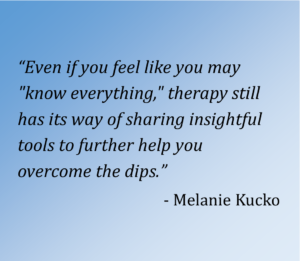by Melanie Kucko, MHC Board of Directors Member
I first started seeing a therapist when I was in high school for anxiety. Over the years I have seen several different therapists for that, as well as other reasons, at various points of my life. While I fortunately never thought to feel ashamed for seeing someone, I realized that my perception of what the experience would be was skewed by the common portrayal of therapy in today’s media. In actuality, I found speaking with a therapist to be much less intimidating, and far more casual. For those of you who may be apprehensive about seeing someone, allow me to set the record straight.
 It’s not the “and how does that make you feel” experience
It’s not the “and how does that make you feel” experience
Well, for some maybe it is, but more often it’s about discussing those feelings emanating from certain situations and experiences in more of a back and forth dialog. I have never reclined on a leather couch with my back to my therapist while he emotionlessly jots private notes as if I were in an uncomfortable, psychological confessional. Rather, we are often face to face in chairs, upright, exploring personal history from new perspectives that help aid in the understanding, and ultimately hopefully acceptance, of a situation.
You don’t just talk about your problems
I’ve had sessions where I didn’t spend a single minute talking about my worries and that was ok. We’ve instead discussed current events, topics of interest, other people’s problems, or at times even my therapist would share his own life stories. If someone is new to therapy, this gives you an opportunity to get to know your therapist before bearing your soul. There’s no expectation that you will need to discuss triggering experiences from the moment you sit down – you can get to those at your own pace. Especially in the times of COVID, simply having someone to chat with is highly therapeutic in and of itself.
Therapy gives you tools you may already know, but includes the instructions on how to use them
As someone who’s had anxiety for over a decade, I am well versed in how to identify anxiety attacks in myself, how to mitigate them, and how to avoid foods and other triggers that may cause them. Even if you feel like you may “know everything,” therapy still has its way of sharing insightful tools to further help you overcome the dips. Anecdotally, one of the best pieces of advice on calming a panic attack I ever received from a therapist was also one of the simplest. He recommended saying “I’ll deal with it later,” during an attack to remove the immediacy that anxiety causes. Despite being such a simple statement, without fail it’s helped me through the years.
Sometimes, it just won’t be the right fit
After a couple of sessions you may sit back and say, “I’m not vibing with this person,” and that’s ok, I have too. It’s not a reflection of therapy, rather the reality that we are all unique individuals, and as such connect with some people better than others. It may be a matter of not having shared lived experience, or simply personality differences. Remember, your therapist is there for you, so if you aren’t feeling that connection, it’s perfectly fine to “shop around.” It would be a disservice to you otherwise, because if you don’t feel fully comfortable or engaged, you’ll have a hard time being fully open.
You can want to go, not have to go
The reality for many is, you can go to therapy because you want to, not because you have to. One in four of us is living with a mental health condition, and many of us are fully functional without intervention – medicinal, therapy, or otherwise. But that being said, it’s a sense of reassurance to know there is a professional available that can ground me when my anxiety spikes, or when I’m curious about the subtle ways anxiety impacts my personality or interrelationships with others. In other words, there is always someone to turn to.
In the end, it is important to recognize therapy as a tool in your mental health toolkit. Sometimes you won’t need it, sometimes you need a reminder on the instructions, but when you do need it, it’s invaluable. If you are in search of a therapist, there are many avenues for example, search engines, 2-1-1, word of mouth, and insurance can recommend providers in-network. However you find them, I wish you the best of luck in your future dialogs!

